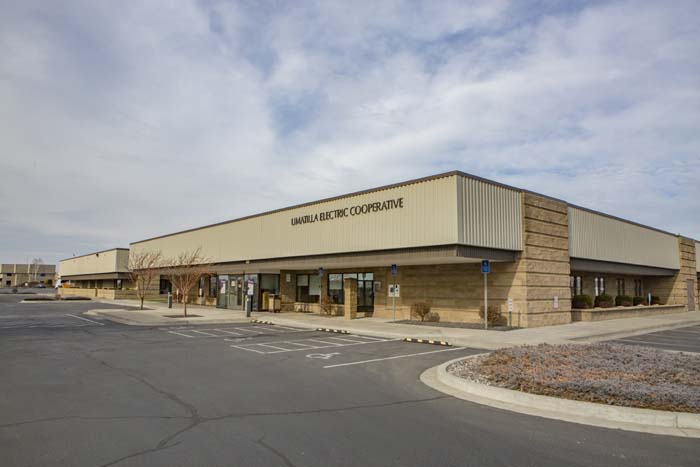Umatilla Electric joins its voice with co-ops nationwide to protect nonprofit status
Published 5:00 am Tuesday, November 12, 2019

- Umatilla Electric Cooperative approved $3 million in February 2024 to be refunded back to members through its Capital Credits program.
Umatilla Electric of Hermiston is one of dozens of electric cooperatives across the nation supporting passage of a bill in Congress aimed at protecting their nonprofit status.
Trending
The cooperatives are asking members of the House of Representatives to pass the “Revitalizing Underdeveloped Rural Areas and Lands Act,” also known as House Bill 2147 and Senate Bill 1032.
The bills were proposed to fix what Steve Myers, Umatilla Electric member services administrator, called “an unintended consequence of the 2017 tax law.”
Meyers said Oregon’s other electric cooperatives — which are collectively represented by the Oregon Rural Electric Cooperative Association — are urging Congress to pass the RURAL Act. He said the co-ops are also asking their customers to contact their congressional representatives, as well, to ask them to vote on the bills in the respective houses of Congress.
Trending
“We have joined other electric cooperatives in Oregon and around the U.S. in supporting this legislation, and we would appreciate any local support for passage of the Revitalizing Underdeveloped Rural Areas and Lands Act (RURAL) Act,” Myers said.
An effort has been underway since this past summer, Myers said, and Oregon Rural Electric Cooperative Association, various electric-co-op managers, board members and other staff from co-ops met with legislators in D.C. and sent letters and emails urging passage.
The concern stems from a provision in the 2017 “Tax Cuts and Jobs Act” that considers federal, state and local grants as “non-member income” and potentially taxable for electric cooperatives.
Ted Case, executive director of the Oregon Rural Electric Cooperative Association, said in his online newsletter, the RURAL Act is “no run-of-the-mill piece of legislation.”
“The RURAL Act allows co-ops to receive grants for a host of programs — including disaster aid, broadband and economic development — without losing their tax exempt status,” he said. “It’s a complicated tax issue. What you need to know is that this bill needs to pass. And soon. The Oregon delegation with its incredible seniority and clout is well-positioned to make it happen. Our senior senator, Ron Wyden, is the ranking member of the Senate Finance Committee.”
Before passage of the 2017 tax law state and federal grants that helped electric co-ops restore service and rebuild electrical infrastructures after a disaster or expand broadband to underserved rural areas were defined as “capital” and not “income.” Electric cooperatives serving 19 million customers banded together to encourage Congress to pass the Revitalizing Underdeveloped Rural Areas and Lands Act.
In order to be considered tax-exempt, electric cooperatives must receive at least 85% of their income from their members. If a co-op receives financial support from an agency like the Federal Emergency Management Agency following a storm or wildfire that increases its non-member income more than 15%, it is at risk of being taxed. To address this provision in the 2017 tax bill a bipartisan group from Oregon’s congressional delegation — U.S. Representatives Earl Blumenauer, Peter DeFazio, Kurt Schrader and Greg Walden — co-sponsored the bill. Myeres said the Oregon co-ops are also looking to Sen. Ron Wyden, the ranking member of the Finance Committee, and Oregon electric co-ops for help.
“This summer we urged our federal legislators, especially Sen. Ron Wyden, to support the proposed law that would protect electric cooperatives’ tax-exempt status when they receive state or federal grants,” Myers said.
Wyden said he fought to strip the new tax on rural electric co-ops from the 2017 tax bill, something he called a “serious concern for electric co-ops and their customers.”
The new bicameral bill aims to eliminate it.
“While the supporters of the 2017 law would not listen beforehand to my common-sense solutions to protect organizations that receive federal aid from getting hit with surprise tax bills, I remain open to sitting down with my colleagues to address the long list of problems in this deeply flawed tax scheme, including protections to ensure ratepayers aren’t the ones suffering from this bad bill,” Wyden said.
To learn more about the Revitalizing Underdeveloped Rural Areas and Lands visit:
www.cooperative.com/news/Pages/Co-op-Advocacy-Needed-to-Move-Vital-Tax-Fix-in-Congress.aspx
www.electric.coop/rural-act-co-op-voices-losing-tax-exempt-status-hurts-rural-residents/
www.electric.coop/majority-house-backs-rural-act-supporters-push-vote









